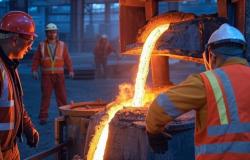Posted on May 06, 2025 at 05:56. / Modified on May 06, 2025 at 06:12.
3 min. reading
Subscribe to access the summary in 20 seconds.
The blackout of April 28 in the Iberian Peninsula hit the south of France without reaching Switzerland. However, there could be political repercussions. In Bern, under the leadership of the Federal Councilor Albert Rösti, some people aspire to relaunch the nuclear sector. The breakdown of last week, as rare as it is spectacular (55 million people deprived of current), gives grain to grind to supporters of the atom. Even if the exact causes of the incident are not yet known, the strong Spanish solar production is pointed out, it would have destabilized the network. And some to regret the Madrid’s decision to closure of its nuclear power plants by 2035.
“The increase in solar production, very decentralized, increases the difficulty of managing the network,” said national councilor Nicolas Kolly, member of the Environment, Regional and Energy Planning Commission (CEAT). The UDC is one of the parliamentarians who believe that it is necessary to return to the 2050 energy strategy. Voted in 2017, it programs the gradual release of nuclear. “Black-out in Spain and Portugal confirms our fears, which will be checked again,” says the elected official.








